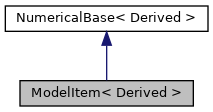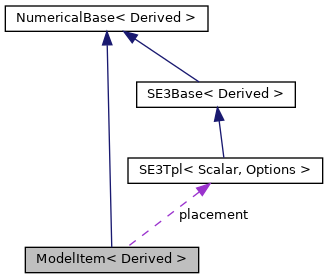|
| enum | { Options = traits<Derived>::Options
} |
| |
|
typedef traits< Derived >::Scalar | Scalar |
| |
|
typedef SE3Tpl< Scalar, Options > | SE3 |
| |
|
typedef traits< Derived >::Scalar | Scalar |
| |
|
|
| ModelItem () |
| | Default constructor of ModelItem.
|
| |
| | ModelItem (const std::string &name, const JointIndex parent_joint, const FrameIndex parent_frame, const SE3 &frame_placement) |
| | Builds a kinematic element defined by its name, its joint parent id, its parent frame id and its placement. More...
|
| |
|
bool | operator== (const ModelItem &other) const |
| |
template<typename Derived>
struct pinocchio::ModelItem< Derived >
Definition at line 13 of file model-item.hpp.
◆ ModelItem()
| ModelItem |
( |
const std::string & |
name, |
|
|
const JointIndex |
parent_joint, |
|
|
const FrameIndex |
parent_frame, |
|
|
const SE3 & |
frame_placement |
|
) |
| |
|
inline |
Builds a kinematic element defined by its name, its joint parent id, its parent frame id and its placement.
- Parameters
-
| [in] | name | Name of the frame. |
| [in] | parent_joint | Index of the parent joint in the kinematic tree. |
| [in] | parent_frame | Index of the parent frame in the kinematic tree. |
| [in] | frame_placement | Placement of the frame wrt the parent joint frame. |
Definition at line 61 of file model-item.hpp.
◆ parentFrame
Index of the parent frame.
Parent frame may be unset (to the std::numeric_limits<FrameIndex>::max() value) as it is mostly used as a documentation of the tree, or in third-party libraries. The URDF parser of Pinocchio is setting it to the proper value according to the urdf link-joint tree. In particular, anchor joints of URDF would cause parent frame to be different to joint frame.
Definition at line 36 of file model-item.hpp.
The documentation for this struct was generated from the following file:


 Public Types inherited from NumericalBase< Derived >
Public Types inherited from NumericalBase< Derived >